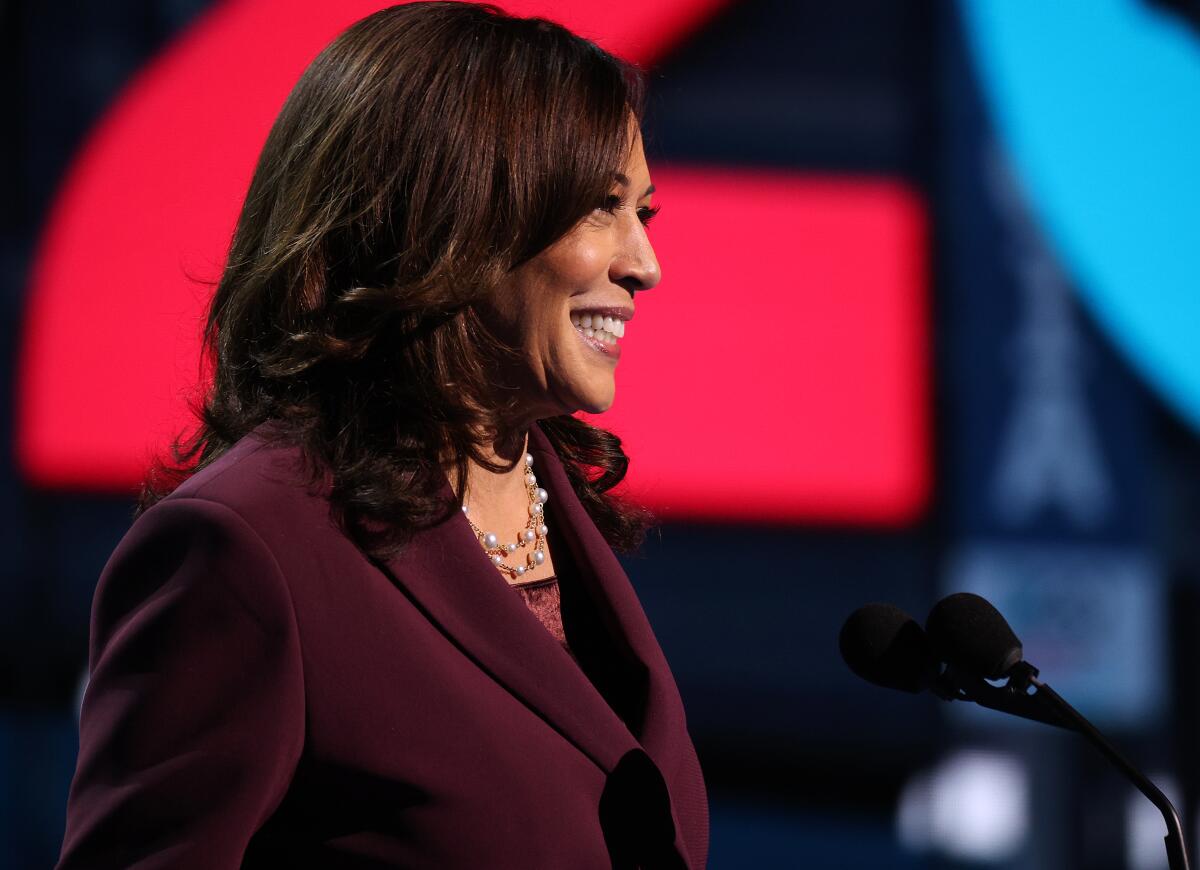Op-Ed: Kamala Harris’ vice presidential run is a campaign to be America’s second Black president

- Share via
Make no mistake, Kamala Harris, not Joe Biden, is on the Democratic ticket as the face of the leadership the country is demanding now. Her vice presidential candidacy, in essence, is a bid to become America’s second Black president.
Biden is running as the Democrats’ fixit man, pledging to restore normalcy and decency to American politics. Harris’ role is symbolic, as veep choices usually are, but what she represents is truly substantive this time: Harris, a Black woman, embodies the most dependable constituency of the Democratic Party, a voting bloc that is finally rising in power and getting its due.
Harris also clearly understands her connection to Black Lives Matter and other grassroots racial justice movements that have been pushing the country toward antiracism for the last four months with historic success.
She is no progressive, but when Harris recites the names of the dead Black men and women whose killings have sent hundreds of thousands into the streets this year, as she did in a speech Thursday attacking President Trump’s policies, she directly acknowledges that it is her job to carry the urgency of Black grievances forward. Those grievances put Harris on the ticket; her lens, not Biden’s, is the one through which Americans are seeing themselves in 2020.
And what a difference 12 years make. Back in 2008, candidate Barack Obama won over the country by Disney-fying Blackness to some degree, selling his Kansas-Kenya-Hawaii story as but one shining example of American diversity that theoretically transcended red and blue state consciousness. That set the tone for a similarly soft focus on Blackness in his administration. However sympathetic the Obama White House was to racial justice, the administration always seemed to fear alienating the white people who voted for him. Obama rarely spoke directly to or about African Americans when it came to policy. It was the classic paradox of integration — the more accepted by the mainstream Black people become, the more constrained they are about bluntly speaking their truth — and progress against racism stalls.
The paradox feels irrelevant now. Harris was nominated because she is Black, not in spite of it. Her presence in the campaign is essential, not something to apologize for or contextualize in a happy-face narrative about a unified America. If Harris weren’t talking straightforwardly about the effects of white supremacy and racism, she wouldn’t seem qualified for the position of president-in-waiting now. It’s a startling turn of the status quo that could launch a new era of legitimate, deeply ethical Black leadership for all.
But sometimes I worry; is Harris up to this job? She is not Obama, but she shares traits with him, traits common to the Black professional class that, frankly, have hampered as much as helped progress in the last couple of generations.
Harris is middle class, a career lawyer. She comes from a stratum that has produced important Black leaders and activists — W.E.B. DuBois, Mary Church Terrell, Thurgood Marshall, Martin Luther King Jr. These men and women blasted through the towering rock of segregation and overt racism that held down everybody. But after the last remnants of Jim Crow fell in the 1960s, those in this cohort were free to seek their own fortunes, to secure the good life, and many did.
In some ways, Black careerism supplanted activism as a form of racial justice. The hard-won achievements of scholars, doctors, lawyers and executives were proof that they were still in the struggle, that it was paying off. But per the paradox, their ascent all but required them to minimize their concerns for the race as a whole. Ordinary Black folks chafed at this dynamic, but they understood it: the need to meet the assimilationist demands of the white majority.
Harris has the goods a presidential candidate needs: telegenic looks, core unflappability and, as recently displayed, oratorical charisma. But she is also primed to undo the racial effacement that has been the price of integration. It helps that she is temperamentally less cautious than Obama: She can be caustic, as we saw when she took apart Atty. Gen. William Barr during a Senate hearing last year, and Biden himself during the Democratic prirmary debates. Harris is willing to flash anger, to display a certain edge. She is utterly comfortable in Black settings that Obama sometimes seemed to find slightly foreign; she’s a Black girl from Oakland whose immigrant parents of color were very attuned to the struggle of African Americans.
“I’m really sick of having to explain my experiences with racism to people for them to understand that it exists,” she told the New York Times when she was asked if she’d been racially profiled. In the same interview, she charged her white friends, puzzled by all the incidents of excessive police force against Black people, with sounding like colonists.
Harris has the moral foundation and the moxie to officially elevate the struggle of Black Americans to the top of our political priorities, where it has always belonged; I only hope she is willing. The lives of Black people are poised to move from the margins of our national narrative to the center. Kamala Harris, our second chance at a Black president, is more than qualified to take us there.
Erin Aubry Kaplan is a contributing writer to Opinion.
More to Read
A cure for the common opinion
Get thought-provoking perspectives with our weekly newsletter.
You may occasionally receive promotional content from the Los Angeles Times.










